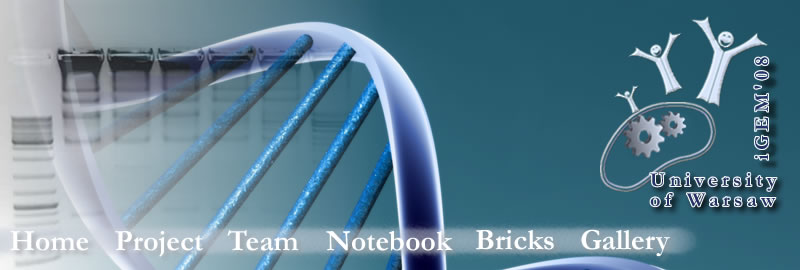Team:Warsaw/Calendar-Main/13 May 2008
From 2008.igem.org
 |
|||||||||
Preparation of pMPMT5+AID construct and PCRs for fusionsMichał K.
 Fig. 1. Gradient PCR products for AID: 1-DNA ladder; 2 to 13-PCR products-border annealing temperatures of gradient: 62°C (lane 2) to 82°C (lane 13) Fig. 1. Gradient PCR products for AID: 1-DNA ladder; 2 to 13-PCR products-border annealing temperatures of gradient: 62°C (lane 2) to 82°C (lane 13)
 Fig. 2. Gradient PCR products: upper - for transcriptional fusion, lower - for translation fusion; 1-DNA ladder; 2 to 12-PCR products-border annealing temperatures of gradient: 62°C (lane 2) to 82°C (lane 12)
Fig. 2. Gradient PCR products: upper - for transcriptional fusion, lower - for translation fusion; 1-DNA ladder; 2 to 12-PCR products-border annealing temperatures of gradient: 62°C (lane 2) to 82°C (lane 12)
 Fig. 3. Gradient PCR products for negative control (Top10 genomic DNA): 1-DNA ladder; 2 to 6-PCR products-border annealing temperatures of gradient: 62°C (lane 2) to 82°C (lane 6).
Fig. 3. Gradient PCR products for negative control (Top10 genomic DNA): 1-DNA ladder; 2 to 6-PCR products-border annealing temperatures of gradient: 62°C (lane 2) to 82°C (lane 6).
|
 "
"





